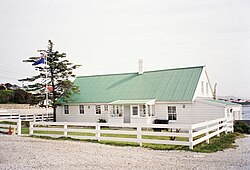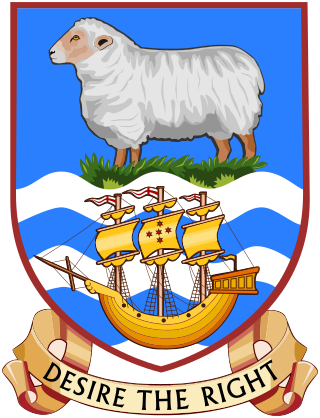
The politics of the Falkland Islands takes place in a framework of a constitutional monarchy and parliamentary representative democratic dependency as set out by the constitution, whereby the Governor exercises the duties of head of state in the absence of the monarch and the Chief Executive is the head of the Civil Service, with an elected Legislative Assembly to propose new laws, national policy, approve finance and hold the executive to account.

The Jason Islands are an archipelago in the Falkland Islands, lying to the far north-west of West Falkland. Three of the islands, Steeple Jason, Grand Jason and Clarke's Islet, are private nature reserves owned by the Wildlife Conservation Society of New York City. Other islands in the group are National Nature Reserves owned by the Falkland Islands Government.

The Camp is the term used in the Falkland Islands to refer to any part of the islands outside the islands' only significant town, Stanley, and often the large RAF base at Mount Pleasant. It is derived from the Spanish word campo, for "countryside".

The governor of the Falkland Islands is the representative of the British Crown in the Falkland Islands, acting "in His Majesty's name and on His Majesty's behalf" as the islands' de facto head of state in the absence of the British monarch. The role and powers of the governor are set out in Chapter II of the Falkland Islands Constitution. The governor in office resides at Government House, which serves as the official residence.

There are over 230 Catholics in the Falkland Islands, approximately 10% of the total population. There are no dioceses in the islands, instead they form an apostolic prefecture which was erected in January 1952. It is immediately subject to the Holy See and separate from any Argentine or UK dioceses. The spiritual leader of the prefecture is Father Hugh Allan who was appointed in 2016.

The Legislative Assembly of the Falkland Islands is the unicameral legislature of the British Overseas Territory of the Falkland Islands. The Legislative Assembly replaced the Legislative Council when the new Constitution of the Falklands came into force in 2009 and laid out the composition, powers and procedures of the islands' legislature.

Port Egmont was the first British settlement in the Falkland Islands, on Saunders Island off West Falkland, and is named after John Perceval, 2nd Earl of Egmont, who was First Lord of the Admiralty at the time of its founding.

The Falkland Islands is an archipelago in the South Atlantic Ocean on the Patagonian Shelf. The principal islands are about 300 mi (480 km) east of South America's southern Patagonian coast and about 752 mi (1,210 km) from Cape Dubouzet at the northern tip of the Antarctic Peninsula, at a latitude of about 52°S. The archipelago, with an area of 4,700 sq mi (12,000 km2), comprises East Falkland, West Falkland, and 776 smaller islands. As a British overseas territory, the Falklands have internal self-governance, but the United Kingdom takes responsibility for their defence and foreign affairs. The capital and largest settlement is Stanley on East Falkland.

Fox Bay is the second largest settlement on West Falkland in the Falkland Islands. It is located on a bay of the same name, and is on the south east coast of the island. It is often divided into Fox Bay East ("FBE") and Fox Bay West ("FBW") making it two settlements: combined, these make the largest settlement on West Falkland, but if separated, Port Howard is the largest. Fox Bay takes its name, like the Warrah River, from the Falkland fox, an animal locally called the warrah and now extinct.
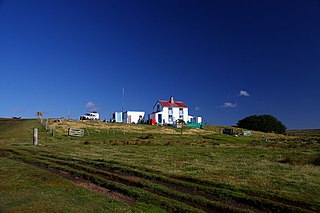
Volunteer Point is a headland on the east coast of East Falkland, in the Falkland Islands, north-northeast of Stanley, and east of Johnson's Harbour and Berkeley Sound. It lies at the end of a narrow peninsula, which protects Volunteer Lagoon. It received its name in 1815, when the sealing ship Volunteer left a boat's crew there to collect seal skins while it went in search of opportunities elsewhere. Four years later, on 13 February 1820, the French research vessel L'Uranie struck a submerged rock just off the point but stayed afloat long enough to be beached in Berkeley Sound. All on board survived, including the Captain's wife, Rose de Freycinet, who recorded the incident in her diary.

MacBrideHead is the most northeasterly point of the Falkland Islands, and is on East Falkland. Mount MacBride is just to its south. There is a sea lion colony here.
Cape Pembroke is the easternmost point of the Falkland Islands, and is on East Falkland. There is an automated lighthouse here.
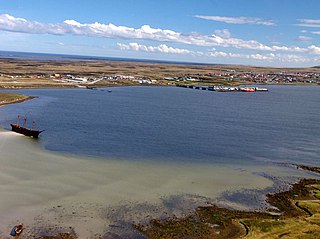
Stanley Harbour is a large inlet on the east coast of East Falkland island. A strait called "the Narrows" leads into Port William.
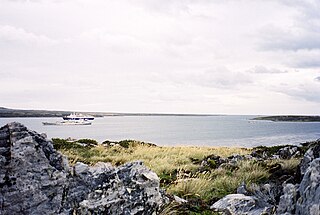
Port William is a large inlet on the east coast of East Falkland island. A strait called "the Narrows" leads into Stanley Harbour.
Gilbert House may refer to:
Port Patterson is a settlement on Carcass Island in the western Falkland Islands. It takes its name from the bay it is on, on the south west coast of the island. It was founded in the late 19th century.
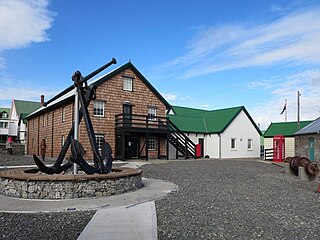
The Falkland Islands Museum is located at the historical dockyard site in Stanley, the capital of the Falkland Islands in the South Atlantic Ocean. It is run by the Falkland Islands Museum and National Trust (FIMNT), which is a registered charity. The museum has no formal collections policy, but it covers the natural and cultural history of the Falkland Islands. The FIMNT is also involved in the care and protection of various sites and structures of archaeological and historic importance through the islands.

The Falkland Islands Constitution is a predominantly codified constitution documented primarily within the Falkland Islands Constitution Order 2008, a statutory instrument of the United Kingdom. The constitution, in its present form, was made on 5 November 2008 by Queen Elizabeth II in a meeting of the Privy Council at Buckingham Palace. It was laid before Parliament on 12 November 2008 and came into force on 1 January 2009, replacing the 1985 constitution.

The Malvina House hotel is a hotel located on Ross Road, Stanley in the Falkland Islands. It now occupies the site of a house built by John James Felton in 1880, John Felton being one of the original Chelsea Pensioners sent to the islands in 1849. He named the building Malvina House after his daughter Malvina, Malvina being an old Scottish name. The original building was demolished in the late 1960s but part of the structure remains and was incorporated into the hotel.
